Last night I finished reading my Folio Society edition of ‘Bleak House’ By Charles Dickens.
First published in instalments from March 1852 to August 1853, this is a superb novel from a writer at the peak of his powers. As is my wont I will not provide details of the story which other readers may wish to discover for themselves, save to say that, through the interminable case of Jarndyce v. Jarndyce, it is a scathing attack on the Court of Chancery, but so much more besides. The scope and complexity of the author’s work reflects that of the legal system itself.
A host of brilliantly depicted characters thread their ways through the narrative in a more thoroughly composed manner than in any of his previous works. There is an abundance of Dickens’s wit and humour and both bucolic and sordid urban descriptions.
There is romance and mystery awaiting resolution at the end of the book, when, as usual, the concluding situations of the panoply of protagonists and supporting characters are strung together like neatly tied bundles of Chancery papers.
There are also desperately tragic lives hopelessly ruined by conditions of the day.
Christopher Hibbert’s introduction is as knowledgeable and informative as usual.
Before lunch I scanned the last four illustrations by the truly inimitable Charles Keeping.
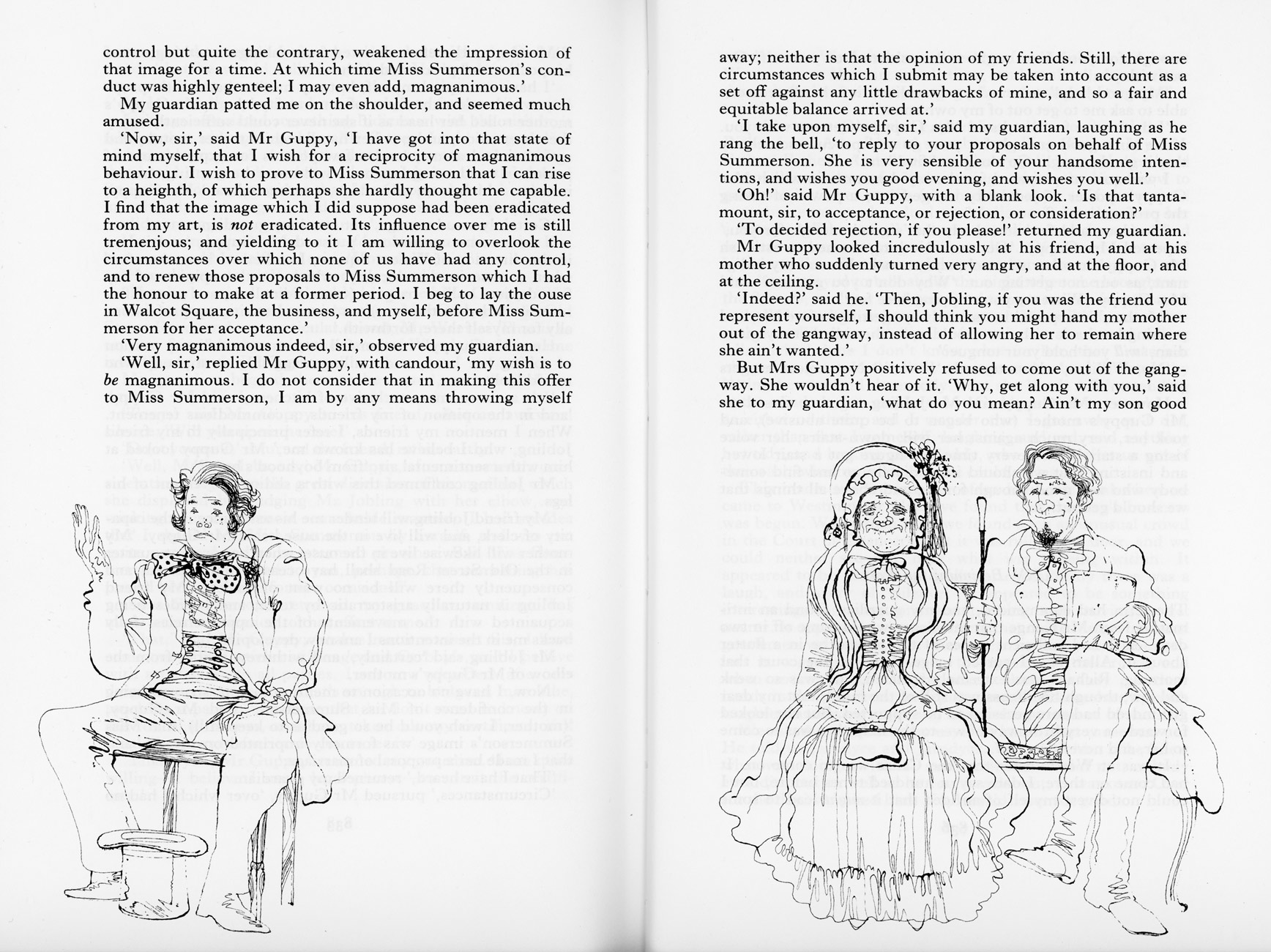
In ‘ ‘I beg to lay the ouse, the business, and myself before Miss Summerson’ ‘ Keeping has suggested the gulf between the speaker and his audience both by the use of the space in the double spread, and by the expressions on the faces.
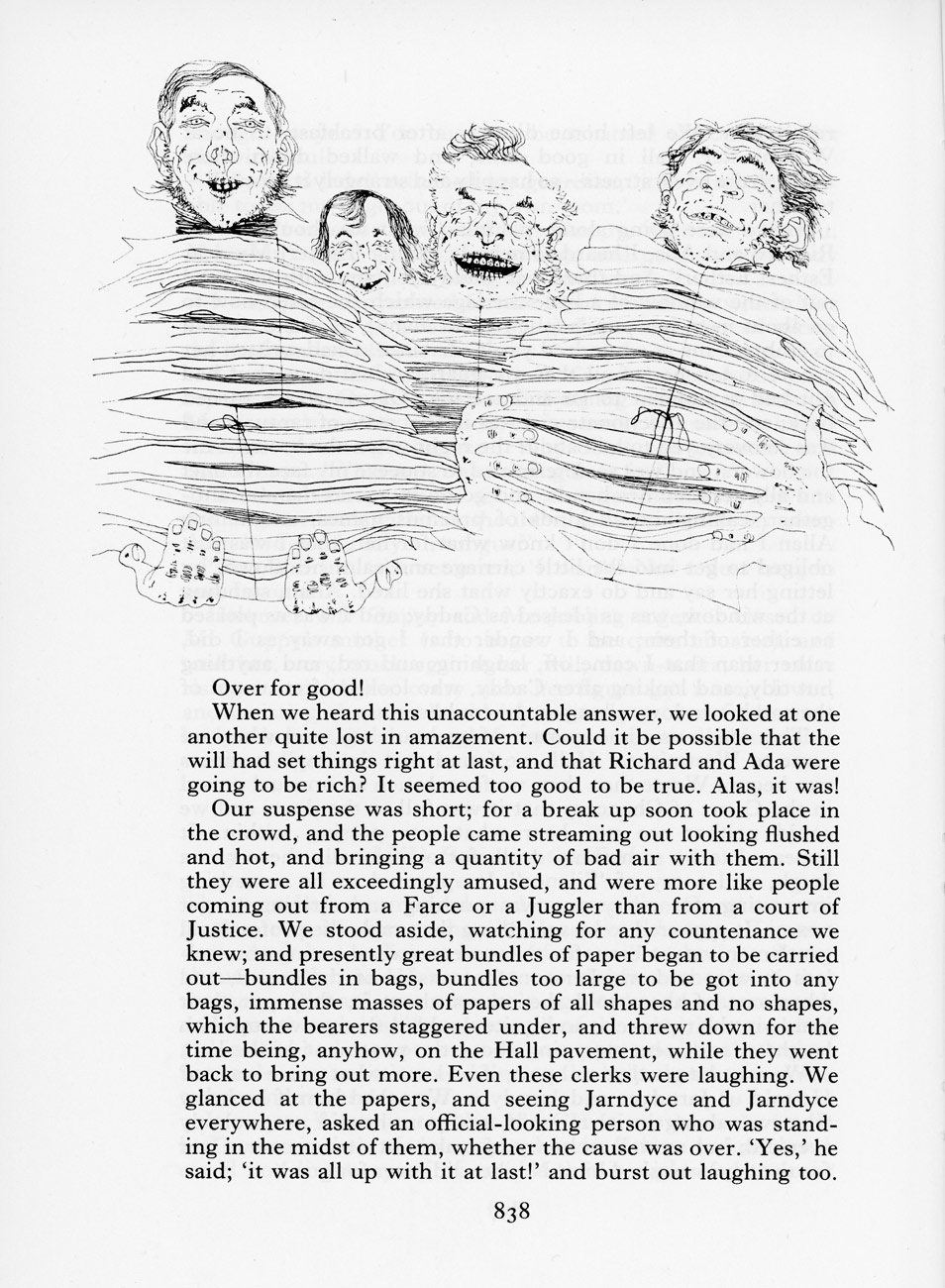
‘Even the clerks were laughing’ has its own story to tell.
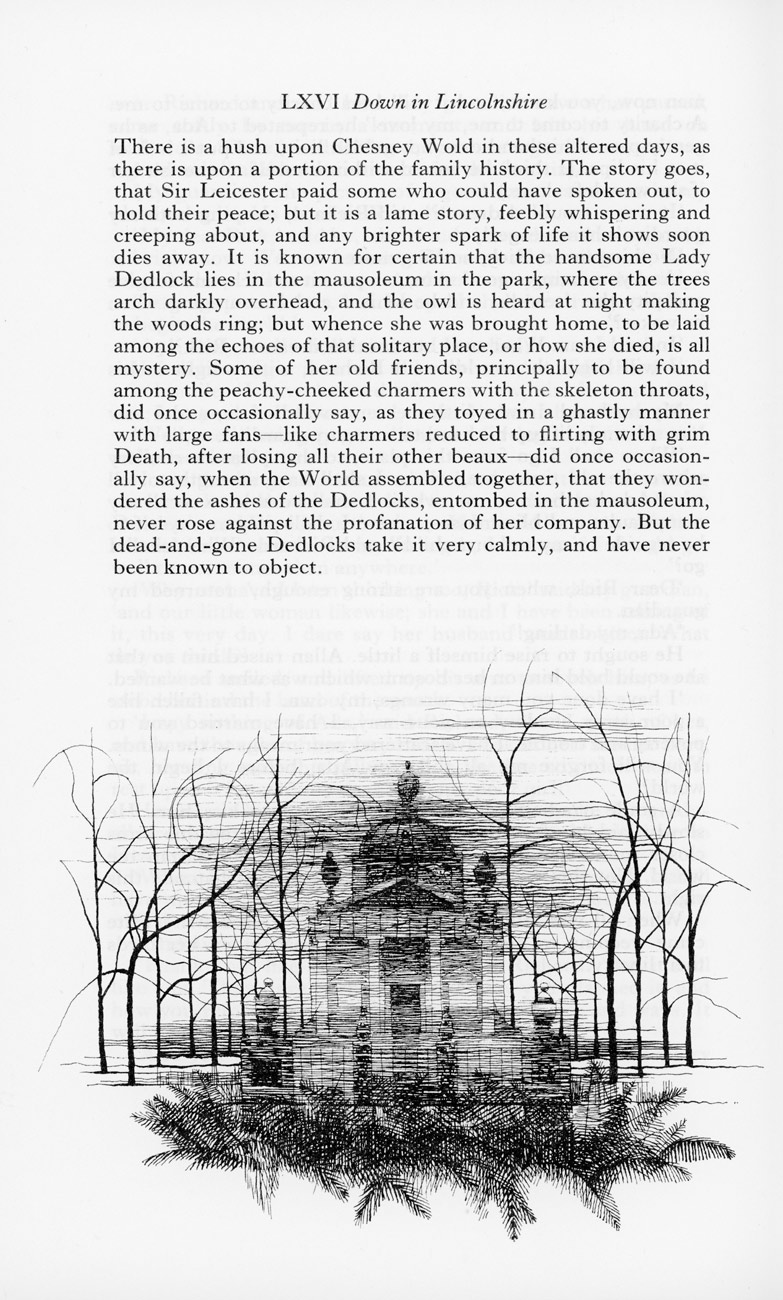
‘The mausoleum in the park’ is suitably forbidding;
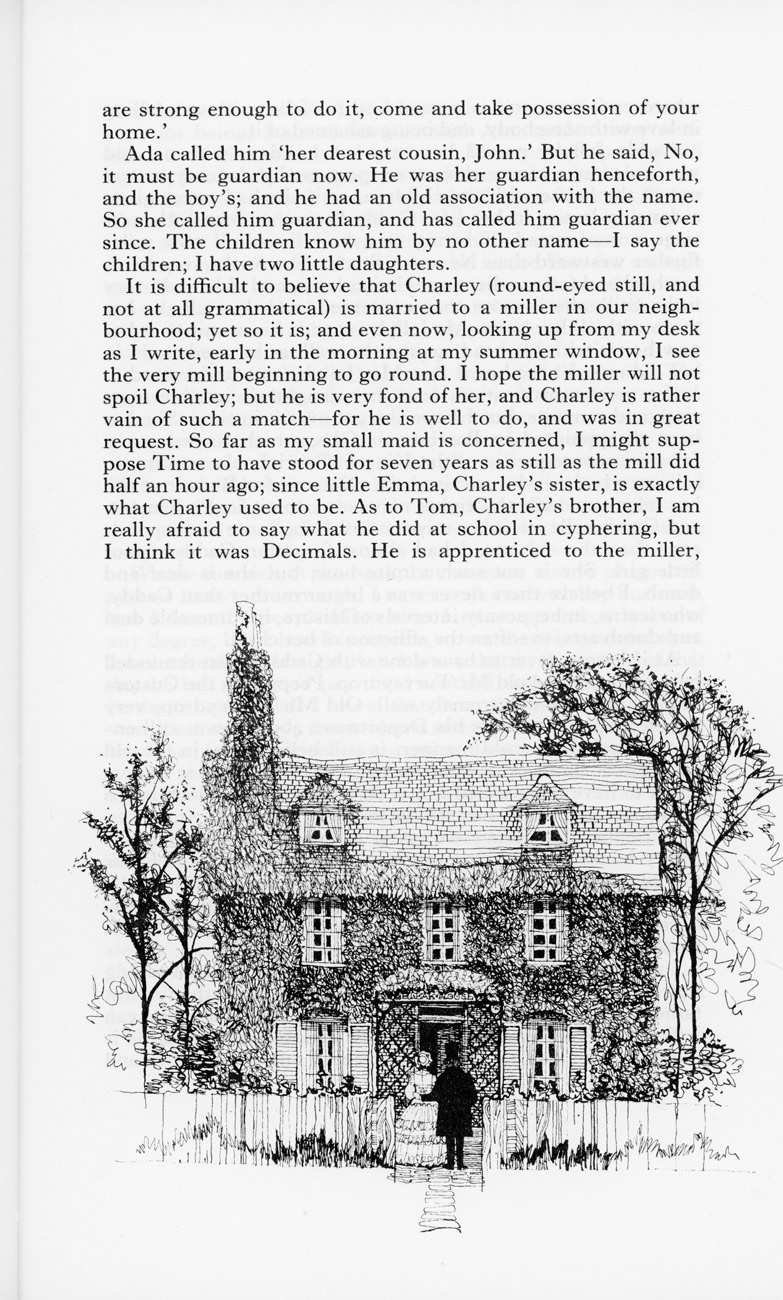
and ‘Bleak House’ Mark 2 quite the opposite.
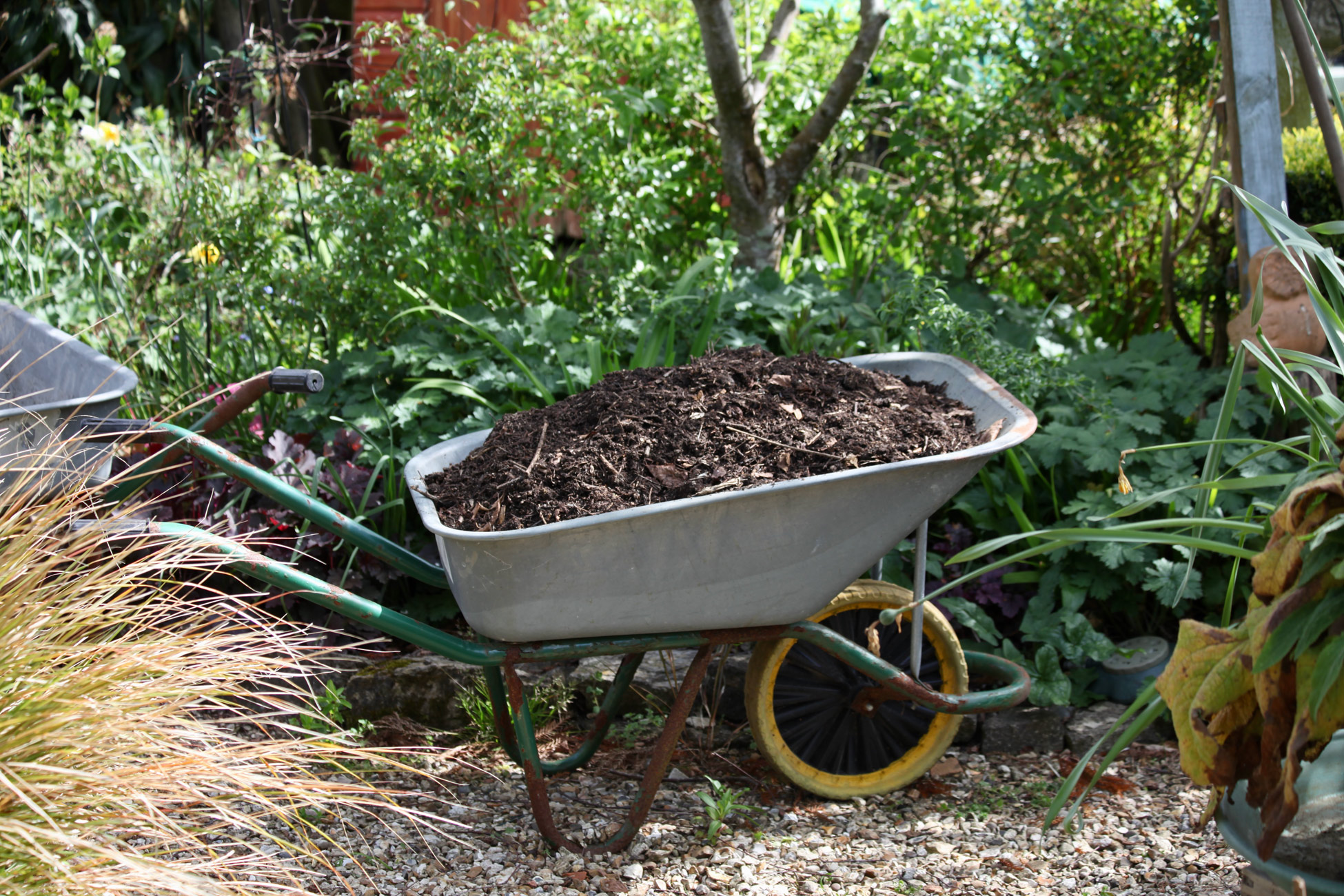

Following Flo’s lead of transferring barrow loads of compost to the Rose Garden yesterday,


Jackie, who had cleaned out the water fountain, and I continued tidying the


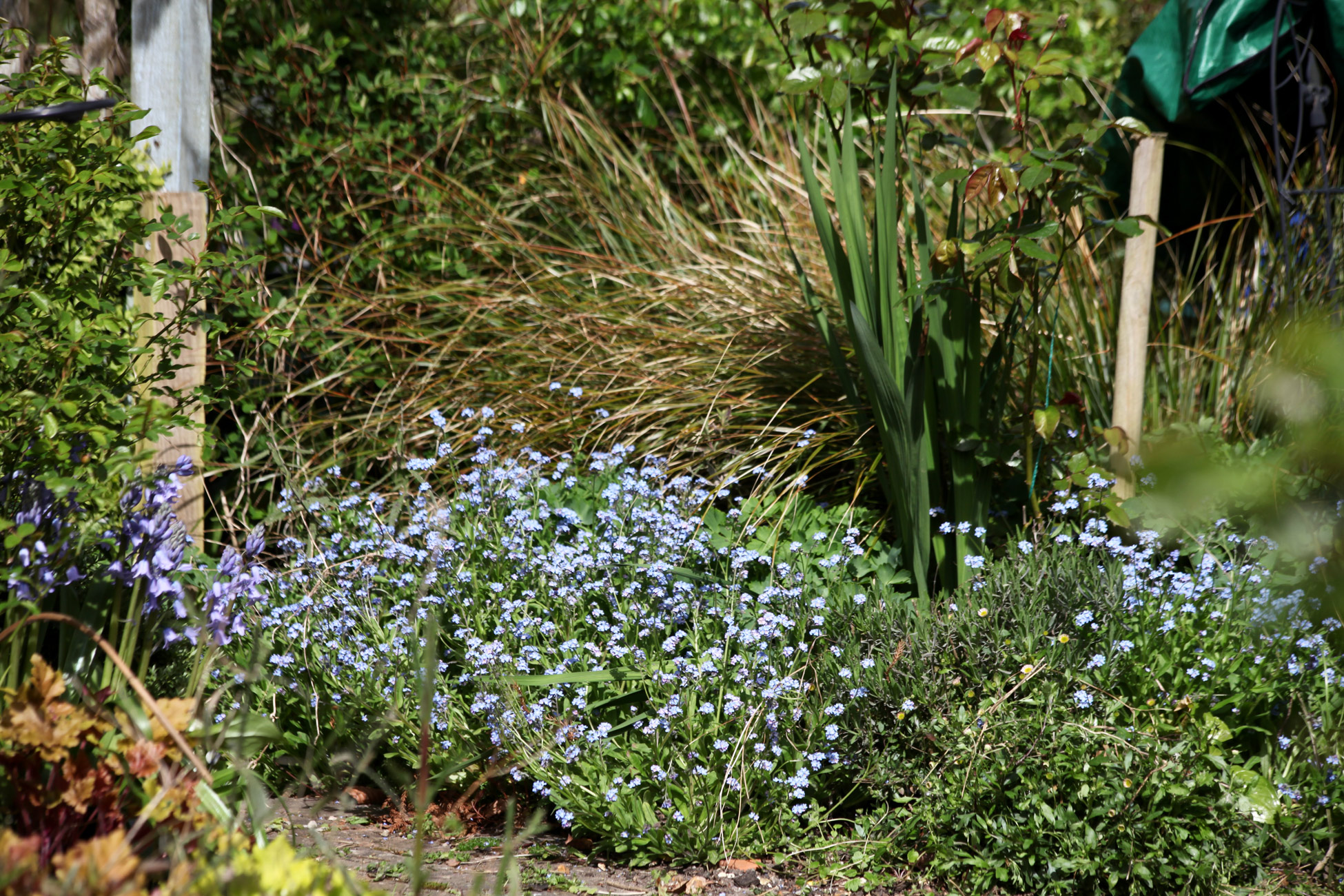

said Garden, now featuring plentiful forget-me-nots and bluebells.
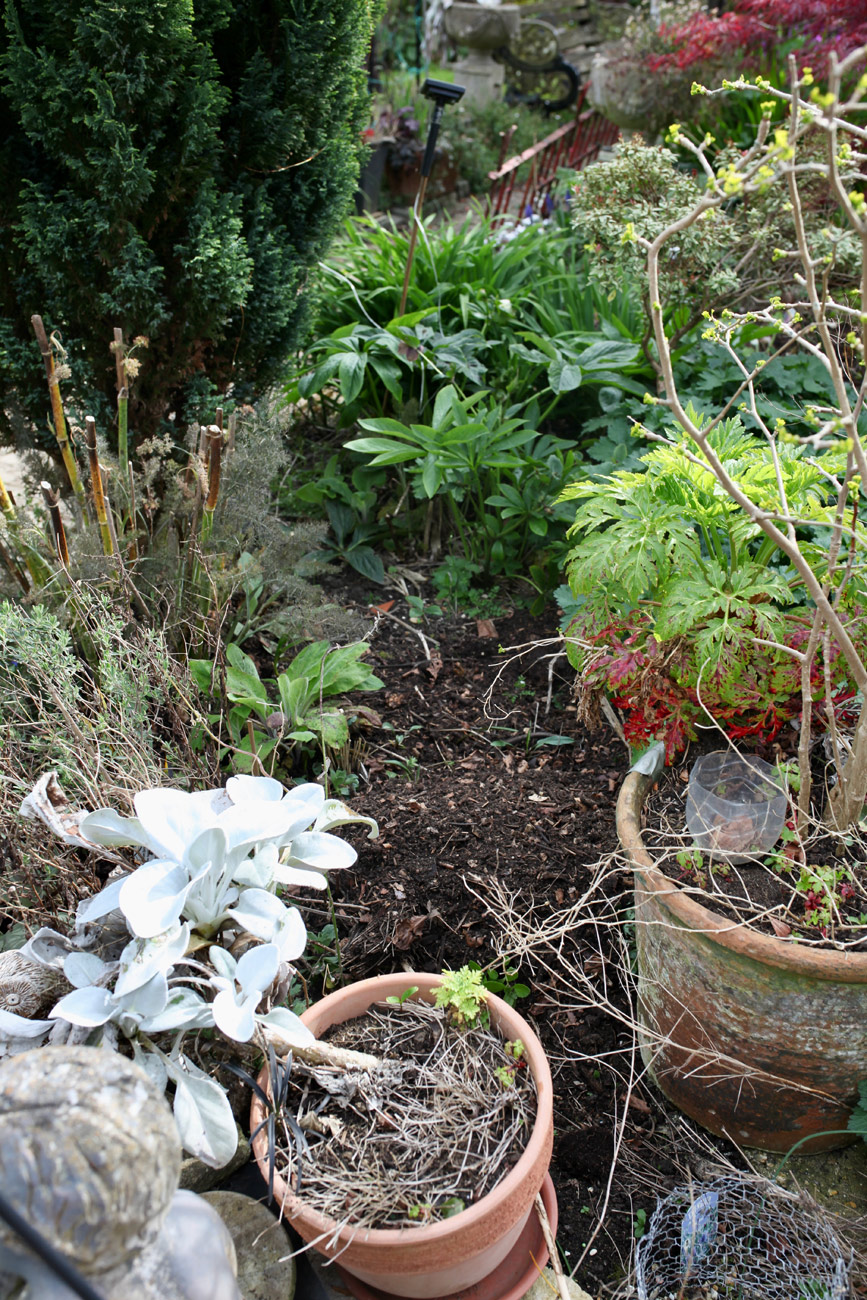
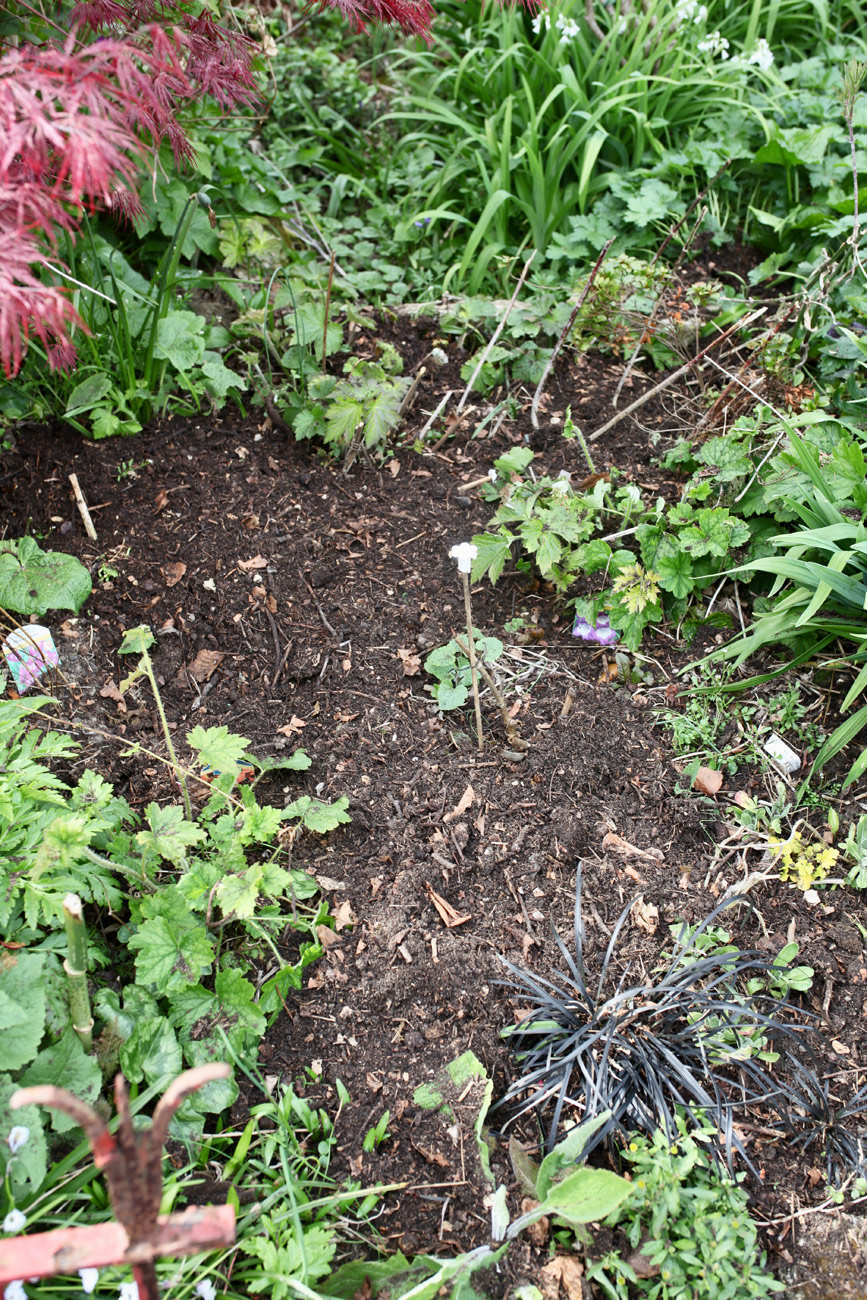
Later, Flo spread more compost on the Pond Bed.
(Yvonne, you need read no further)
This evening we dined on Jackie’s perfectly cooked roast lamb dinner; complete with crisp Yorkshire pudding, sage and onion stuffing, and roast potatoes, including the sweet variety; crunchy carrots, firm broccoli, and tender cabbage; all with meaty gravy. Rice pudding laced with strawberry jam was to follow. The Culinary Queen drank Hoegaarden and I drank Patrick Chodot Fleurie 2019.
Sometimes I want to finish a book, but I also don’t want to come to an end. Wonderful drawings.
The garden is beautiful, and Jackie shines brightly within it.
I’m with Yvonne for the meal–at least the beginning. The vegetables sound great! 😊
Finally, an understanding supporter. 🙂
I don’t eat meat. 😊
Thanks very much, Merril
You’re welcome, Derrick.
Everyone deserved a blow-out meal after all that gardening
Thanks a lot, Sheree
The happy fountain adds to the radiant portrait of Jackie. Wonderful captures, Derrick.
Thanks very much, Maj
I love the first illustration. It looks like a productive Easter was had by all. What will you read now?
A shorter Russian novel is under way. Thanks very much, Pat
I haven’t read Bleak House. You make a good case for rectifying the oversight.
Thanks very much, Liz
You’re welcome, Derrick.
The garden is looking good, guys! ❤️
Thanks very much, John
I wonder who was the original person to be remembered by forget-me-nots?
Now, there’s a thought provoking question. We’ll just never know, will we?
I wish I could remember. Thanks very much, John
I haven’t read Bleak House either. Someday…
Thanks very much, Laurie
The rice pudding with strawberry jam sounds even better than the garden looks.
Thanks very much, Tootlepedal
Thank you for persevering and bringing to life in a new way 💐
To be honest, nature wins over literature every time with me
🥰
Thanks very much, Val. True
Happy Easter Derrick. Warm regards to Jackie.
Thank you Arlene, I hope your Easter is good.
It was, thanks Jackie.
Thank you very much, Arlene.
I’ve enjoyed the diversity of “Bleak House” illustrations. The fountain is beautiful, like Jackie’s smile.
Thank you so much, JoAnna
The weather looks good for gardening. 🙂
Thanks very much, Chrissy. Even a little too hot
Bleak House is superb, but so is Great Expectations. Happy Easter Derrick! 🥚🐇🐾🙏
Thanks very much, Cindy
Happy Easter
Have a blessed week
Thanks very much, More
You’re welcome Derrick
Despite you very thoughtful warning, my eyes immediately leapt to the dreaded “L” word.
But, the rice pudding sounds yummy.
It is rather counter-productive to warn you, Yvonne. Thanks very much
Keepings illustration of the Bleak House, mark 2, is intricately magnificent Derrick …
Thanks very much, Ivor
You have summarised the classic beautifully while retaining the suspense of the story. Sometimes, the hard hitting styles and techniques of modern writers makes me want to read Charles Dickens’s books again. Charles Keeping has remained faithful and astute till the end.
The garden is never short of intense activities, thanks to the passionate Head Gardener. She looks pleased at the proceedings.
Happy Easter!
🌸🥚🙏💐🐣💜⛪🌷🌞✝🐰🌼🦋
What beautiful photos!
Ooh…just the mention of that rice pudding makes me hungry! 🙂
(((HUGS))) 🙂
Thank you so much, Carolyn. Your Easter wishes reciprocated X
Great job, you both are doing!
Tank you very much, GP
Beautiful photos and love Jackie’s contagious smile! Dinner sounds scrumptious.
Thank you so much, Eugi
You’re welcome, Derrick.
What a pleasure must be to work in that piece of heaven 🌸☺️
Thank you very much, Ribana
Dickens, before becoming a published author, spent a lot of time in the Courts and studied the criminals and judicial system of those days. His satirical humour is aplenty in many of his novels.
Thank you very much, Geeta
I really enjoy these illustrations, Derick.
Thank you very much, Robbie
It looks like you had a warm sunny day in the garden there, Derrick and Jackie! Everything looks beautiful.
Thank you very much from us both, Lavinia
I do like those drawings!
I’m pleased, Barbara. Thank you very much
You’ve got a delightful garden! Love it!
Thanks very much, Trent
Great drawings from that version, just like last year the Little Dorrit drawings were great.
Thanks very much, Trent
Thanks a lot, Trent
Great post, Derrick. I just finished the book tonight. ” it is a scathing attack on the Court of Chancery, but so much more besides. The scope and complexity of the author’s work reflect that of the legal system itself.” Even the subtle conversations, especially of the attorneys, the detailed descriptions, and complicated relationships alluded to this theme of the court system. I had a vague notion of that, but you stated it succinctly.
Thank you so much, Marsha
You’re welcome. I tried giving my husband the 2 minute summary version before he fell asleep on me! LOL
Thank you very much, Yvette
Just wanted to say thanks again for your bleak house shares
You rock!
And this is my fav part of this post –
“There is romance and mystery awaiting resolution at the end of the book, when, as usual, the concluding situations of the panoply of protagonists and supporting characters are strung together like neatly tied bundles of Chancery papers.
There are also desperately tragic lives hopelessly ruined by conditions of the day.”
Thank you for this, Yvette
HI Derrick, a lovely ending to your Bleak House series of posts which I missed previously. I am also going to join in the Dickens challenge this year. Robbie (I have two blogs)
Thank you very much, Robbie